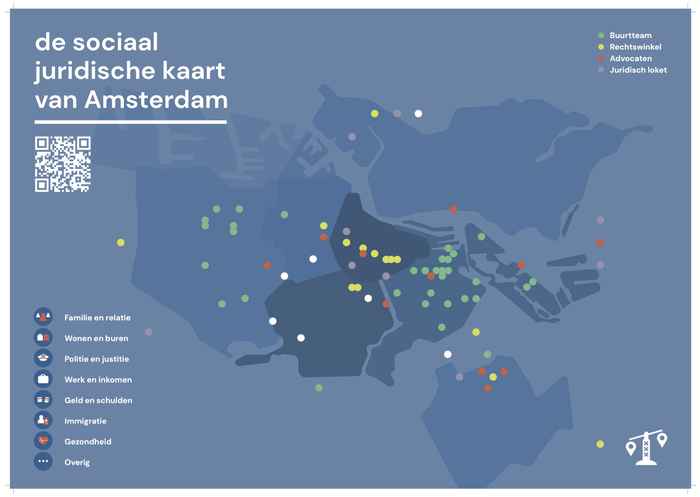Sociaal juridische kaart van Amsterdam
Amsterdam Law Hub

In our research project "De Boodschappentas" we investigated together how social legal assistance currently deals with processing 'shopping bags' of legal problems faced by people in the Netherlands. We specifically looked at the possibilities and solutions that exist (or could exist) through the use of technology and digital tools. The ultimate end product that emerged from this is the social legal map of Amsterdam. Developed in collaboration with Patroon and thanks to funding from the Legal Aid Board.
Goal
The aim of the sociaal juridische kaart is to make it easier and more efficient for citizens to be assisted by a legal aid provider. Citizens often come into contact with a lawyer too quickly for issues that could have been resolved earlier. A network of social counselors, legal aid desks, legal clinics, neighborhood teams, legal consultations, and other (informal) legal aid providers can assist a citizen. But who should you turn to for which legal area? And how can legal aid providers refer to each other more quickly and effectively?
The sociaal juridische kaart van Amsterdam (social legal map) is the first place where a unique network of (social) legal aid providers comes together. Free of charge and accessible to everyone.
Activities
- Research project "De Boodschappentas" initially investigating the role of digital tools in frontline legal aid provision.
- Prototyping based on in-depth research insights. Guided brainstorming sessions involving technical and legal experts, students, and partners outlined an ideal solution for expediting problem resolution in social legal aid.
- The prototype underwent refinement during the development and testing phase through iterative software sprints of two weeks. The final product, utilizing Natural Language Processing (NLP) techniques developed by Bluetick and labor market research experts, identifies dossier contexts and assesses their relevance to legal sources. Continuous user feedback guided the development process to ensure the solution met the needs of users and legal aid providers.
- Campaign WIJ ZIJN MOKUM highlighted legal aid providers on the map to raise awareness of the platform.
Impact numbers
- A (visual) and social legal map that charts all (in)formal social legal aid providers in Amsterdam and assists vulnerable citizens in resolving their complex legal issues.
- The social legal map has been viewed 16.3K times.
- 113 legal partners are connected to the map.